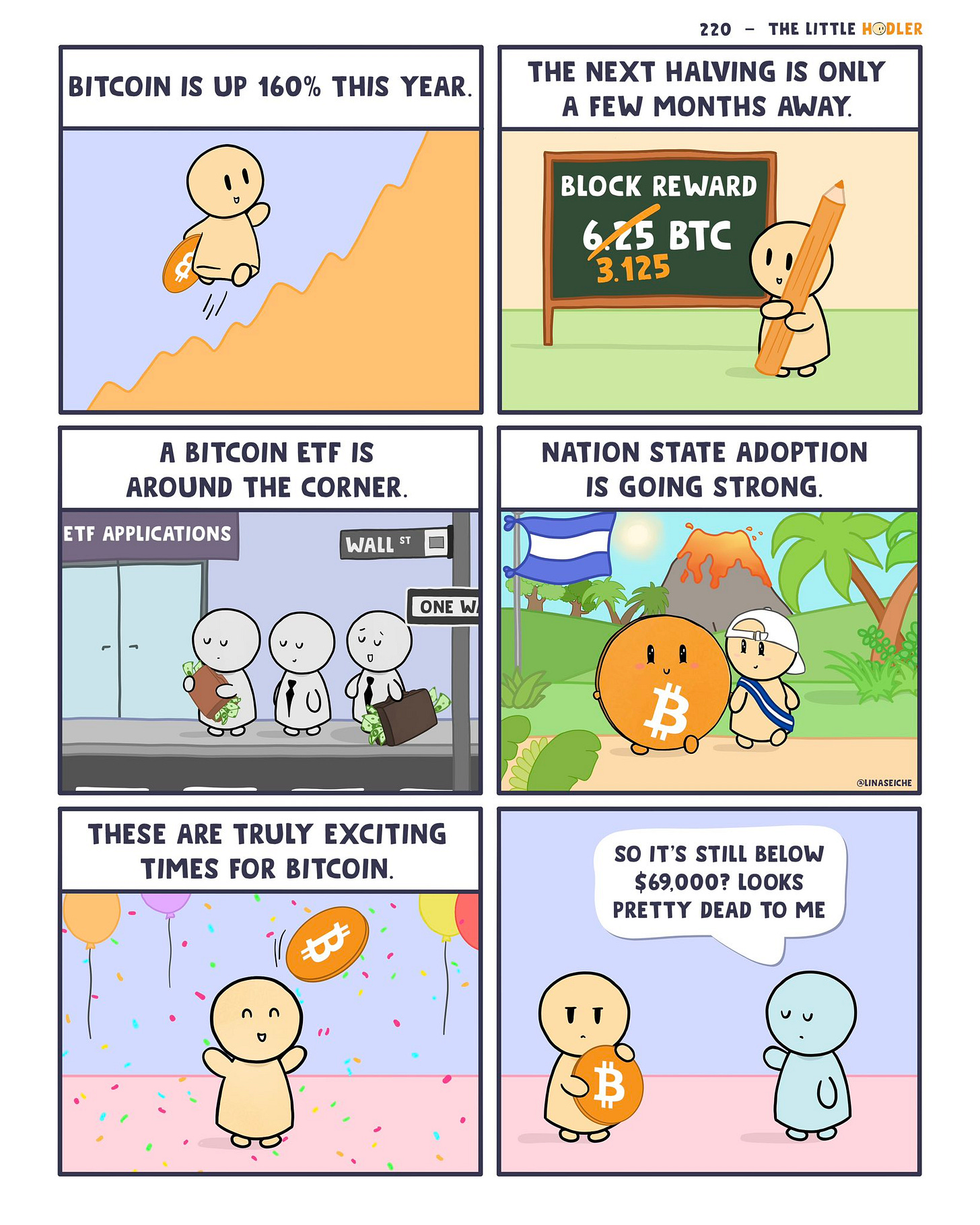Bitcoin Tech Talk #376
Interesting Stuff
Over-reliance on p-values - The article is a takedown of psychology but it can just as easily be applied to a vast portion of academia. The basic idea in the article is that papers these days are mostly about weak correlations and not about scientific laws. As the article points out, the practice of using statistical techniques as the main results of research has wrought mostly meaningless and wishy washy papers that don’t deserve the honors or trust of science. As the amount of research has exploded in the past 50 years, the quality has drastically been debased and like most of the fiat world, has essentially stayed stagnant, while looking very busy and statistical techniques have enabled it.
Why Nations do What They Do - The article starts as a review of a book about Australia and how they’ve more or less followed the US’s lead internationally. But then it expands to what drives nations to do what they do. Rather than the security school of nation-state motives, the article shows how it’s the moneyed class that determine foreign policy, at least in the US. The framework helps explain so much of war policy and why the US continues to get embroiled in wars that don’t benefit its security. It’s a shame that the author didn’t emphasize the role of fiat money, but that’s surely a large part of it.
Why people Keep Things - Ever wonder why you end up not using something that you got, despite having many opportunities? That’s the phenomenon that the article explores, specifically our tendency to think of something as “special” and not using it for its intended purpose. What’s been interesting for me is that I’ve found much more of a willingness to part with possessions or to consume them that I’ve been in Bitcoin. I suspect that there’s some mental connection between not having a good store of value and hoarding. Something to think about as we get a lot of presents today.
What I'm up to
Academia - I talked to Korok Ray, professor at Texas A&M about what Academia is like these days. I was pretty surprised at the near complete dependence that science and engineering has on the National Science Foundation and the almost complete lack of emphasis on entrepreneurship in academia these days. What was particularly galling for me, as a programmer was how little of the art of programming was being taught. Thankfully, Korok is one of the good guys that’s correcting a lot of that, and it was good to see how he was making things better through his Bitcoin class.
Pleb Underground - I was on this show to talk about the book and a bunch of current issues. I put to bed the myth that altcoins increase Bitcoin adoption, talked about how education has become compliance training. We talked about how the double-income households are just enslaved and not liberated and how art is much more about marketable artists than the merit of the art piece itself. We also went into how there’s a minimum level of acceptability that music needs to meet because there are other usages like for dancing and background tracks. Lastly, I talked about the lack of economic education among technical people.
FROST/MuSig/Taproot Class - Time is almost up to sign up for the 1-day Taproot class in Austin January 8th. This class will be in the style of my Programming Blockchain classes, which are based on coding the concepts as you learn them and with real transactions on testnet and signet. I already have around 10 people signed up. Spots are scarce, so apply today!
Nostr Note of the Week
What I’m Promoting
Unchained Capital is a sponsor of this newsletter. I am an advisor and proud to be a part of a company that’s enhancing security for Bitcoin holders. If you need multisig, collaborative custody or bitcoin native financial services, learn more here.
Bitcoin
The Witness Discount - Brandon Black writes in this Bitcoin Magazine article about virtual bytes and why Witness field elements are cheaper than other parts of a transaction. There’s a nice table of how much each multisig smart contract costs in terms of actual bytes versus how much they’re charged in terms of fees (virtual bytes). For any wallet developer, understanding the discount is a critical part of good wallet design, and this is a good overview for aspiring devs.
MuSig2 BIPs - Besides the BIP327 MuSig2 spec, there are now two additional proposed BIPs for MuSig2, one for compatibility with PSBTs, and the other for compatibility with descriptors. Though there’s no way for us to know on chain MuSig2 is being used or not, I suspect it isn’t as of yet. The difficulty with MuSig2 is that there are nonce-related security concerns that wallet developers are not used to having to deal with. FROST has similar issues and ultimately, I think what will be required is a brand new wallet design which are Taproot-only and don’t use BIP32 seeds.
Layer 2’s on BitVM - The potential of BitVM is really starting to get explored and we can see how to reason about it in this post. The limitations of BitVM are laid out here and the trust model for a layer 2 a lot easier to think about. Within BitVM, the provers have to be known ahead of time, instead of defining them at runtime, so while you can’t have a “anyone with proof of fraud can take the money,” it’s better than trusting that a majority of the participants will be honest. It’s clear that we’re just scratching the surface on what will make sense and this is likely to be a significant project for a long time going forward.
Lightning
LND DoS bugs - This writeup by Gogge is about a couple of denial-of-service vectors in lnd that were disclosed around a year ago. The first is a way to issue channel updates for a channel that hasn’t been established yet, which could be used to force the node to run out of memory and the second is a way to drown out legitimate, signed channel updates by flooding it with unsigned ones. Both are good examples of having to be very careful with network interactions.
Ghost Addresses - This is an interesting innovation on Lightning Addresses in that you don’t actually need control of a domain to receive payments to your Lightning node, just someone that’s kind enough to fake it for you. The basic idea is that the ghst.to domain will essentially direct the payer to your node and set up a phantom node and phantom channel to give you the hint that it’s actually a payment to you! It’s a clever idea to essentially commoditize domains for lightning and I’m sure this or something like it will become a service that you can pay for in the future.
Rebalancing using Liquid - In this high fee environment, routing nodes need to use every trick in the bag to avoid on-chain transactions. And this is where Liquid has been getting a lot of hype lately. The post goes over how to use peerswap to rebalance channels on Liquid. PeerSwap is a submarine swap of Lightning sats for Liquid sats. You can then use those Liquid sats to open another channel or swap again for more Lightning sats, balancing the channels you have. It’s a clever method for keeping your channels alive, and I expect these sorts of ideas to gain more traction during high fee environments.
Economics, Engineering, Etc.
Ridiculous Government - Jeffrey Tucker takes government to task for how authoritarian it’s become, even compared to 10 years ago. As he points out, there’s a lot of centralized planning that have backfired completely and the economy being just one of many. Yet the power grab continues unabated. As the disasters pile up, what other release valve is there besides a massive reaction? I suspect that Bitcoin is just the start and that there’s a lot more reckoning besides.
Questioning Liquid’s Scalability - Ben Carmen asks the very pertinent question of Liquid’s scalability given its popularity during this particular fee spike. As he points out, the trust model is federated, but the cost of a blockchain is still being paid. He points out that there are other technologies that make more sense that are more scalable given this trust model, like a federated e-cash system. He has some good points, and I’m starting to come around to the idea that centralized assets like USD really can be efficiently and scalably transacted using some form of e-cash.
Foundation Master Plan - The Foundation Passport is a well-known hardware wallet device, and it’s got a great UI for cold storage, particularly for multisig. What’s particularly encouraging about them is this post which is talking about what their ambitions are. They want to create freedom hardware devices and to empower people to take back sovereignty over their digital lives. I don’t think the missions of these companies is talked about enough. The way most companies get corrupted is not being veered off of a goal, but being seduced because they didn’t have a clear goal to begin with.
Quick Hits
Zooko out at ZCash - At least as CEO. This was one of the biggest projects back in 2016. Sad to see how it’s declined in both interest and development since.
SBF is a megalomaniac - Or delusional, which is what his lawyer basically hinted.
Bitcoin Contracts in Argentina - Not talking options or futures, but normal legal contracts can be settled in Bitcoin without legal tender laws getting in the way.
ETF Meeting - A very rare meeting occurred between the SEC and all the ETF applicants, making clear that everyone needed to do cash creates.
Fiat delenda est.








